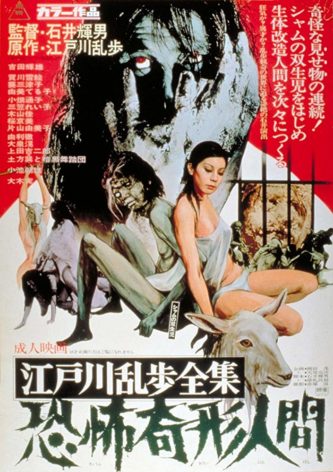 Like many cult movie buffs the world over, I’ve long been curious about this long-banned Japanese film. It’s inevitable, I guess, that I was disappointed upon finally seeing HORRORS OF MALFORMED MEN, which isn’t nearly as bizarre or subversive as it’s been cracked up to be. It does have its moments, however!
Like many cult movie buffs the world over, I’ve long been curious about this long-banned Japanese film. It’s inevitable, I guess, that I was disappointed upon finally seeing HORRORS OF MALFORMED MEN, which isn’t nearly as bizarre or subversive as it’s been cracked up to be. It does have its moments, however!
HORRORS OF MALFORMED MEN (KYOFU KIKEI NINGEN; 1969) was by far the most controversial film ever made by the late Teruo Ishii, one of Japan’s most prolific—and notorious—cult auteurs. The film was vigorously protested upon its initial release, and promptly banned by its own studio Toei for the following three decades. So maligned was the film that the very mention of its title (which allegedly contains degrading overtones not apparent in the English translation) is considered taboo in Japan. Of course these days the furor seems puzzling, as it’s far from the most offensive of Ishii’s works–I’d say his aptly titled JOYS OF TORTURE series, made before HORRORS OF MALFORMED MEN, outdoes it in most respects.
Teruo Ishii was reportedly a lifelong fan of the works of Edogawa Rampo, Japan’s foremost mystery scribe, and based this film on Rampo’s novella THE STRANGE TALE OF PANORAMA ISLAND, along with elements culled from the Rampo tales “Ogre of the Secluded Isle”, “The Human Chair” and “The Walker in the Attic”. Other Rampo-based films include THE BLIND BEAST (1968), BLACK LIZARD (1968), THE WATCHER IN THE ATTIC (1976), THE MYSTERY OF RAMPO (1995), GEMINI (2000) and BLIND BEAST VS. KILLER DWARF (2001), Teruo Ishii’s final feature.
Hirosuke is a young medical student suffering from bizarre visions involving malformed women and the rocky coast of a far-off island. He also discovers one day that a man has recently died who looks exactly like him. In a misguided effort at ferreting out the mystery man’s identity, Hirosuke pretends to be his dead doppelganger and moves in with the latter’s wife. She buys into Hirosuke’s ruse but is discomfited by his coldness toward her. Hirosuke for his part is preoccupied with his quest, investigating circus sideshows and eventually a secluded island he recognizes as the landscape of his visions.
On the island he meets the freakish Jogoro, who lords over a kingdom of human oddities. In a seaside cave Jogoro reveals to Hirosuke the secret of this freak paradise: years earlier Jogoro caught his wife canoodling with another man and so brought them both to the island, where he let them starve to death in the very cave he and Hirosuke now stand in. Jogoro further admits that he kidnapped several unsuspecting women from the mainland and surgically transformed them into malformed humans. And Jogoro discloses yet another secret: years earlier he birthed twins, of whom Hirosuke is one. There are even more (many more) secrets, but in the interests of keeping this summary to a manageable length I’ll leave them for you to discover on your own.
To be frank, Teruo Ishii, despite his cult status, was never a terribly great director. He had an annoying penchant for overheated melodrama and lurid exploitation, both very much evident in HORRORS OF MALFORMED MEN. There’s also the fact that he wasn’t much of a storyteller, proven here in the way he packs in an unconscionable amount of back story, leading to an overabundance of flashbacks. The reason for this was apparently Ishii’s desire to include as many Edogawa Rampo-inspired concepts as possible, but the resulting film is a mess narrative-wise.
Where Ishii excels is in gruesome and surreal imagery. Often shot through multi-colored filters, Ishii’s visions of malformed humans drifting trance-like (the freaks were portrayed by a real-life dance troop) through cobbled streets won’t ever misplace the work of Jodorowsky or Arrabal, but do make for deeply striking, never-before-seen images. There’s also an agreeably outrageous bit toward the end in which a lover’s dying wish to be reunited with his beloved is granted in a decidedly unexpected manner. It’s just too bad the film is otherwise such an overplotted jumble.
Vital Statistics
HORRORS OF MALFORMED MEN (KYOFU KIKEI NINGEN)
Toei Co.
Director: Teruo Ishii
Screenplay: Teruo Ishii, Masahiro Kakefuda
(Based on stories by Edogawa Rampo)
Cinematography: Shigeru Akatsuka
Cast: Teruo Yoshida, Tatsumi Hijikata, Minoru Ohki, Asao Koike, Yukie Kagawa, Teruko Yumi, Mitsuko Aoi, Mie Hanabusa, Yukie Kagawa, Yumiko Katayama, Katsura Kiyama, Michiko Kobata, Hideo Ko, Masaomi Kondo, Reiko Mikasa, Miki Obana
